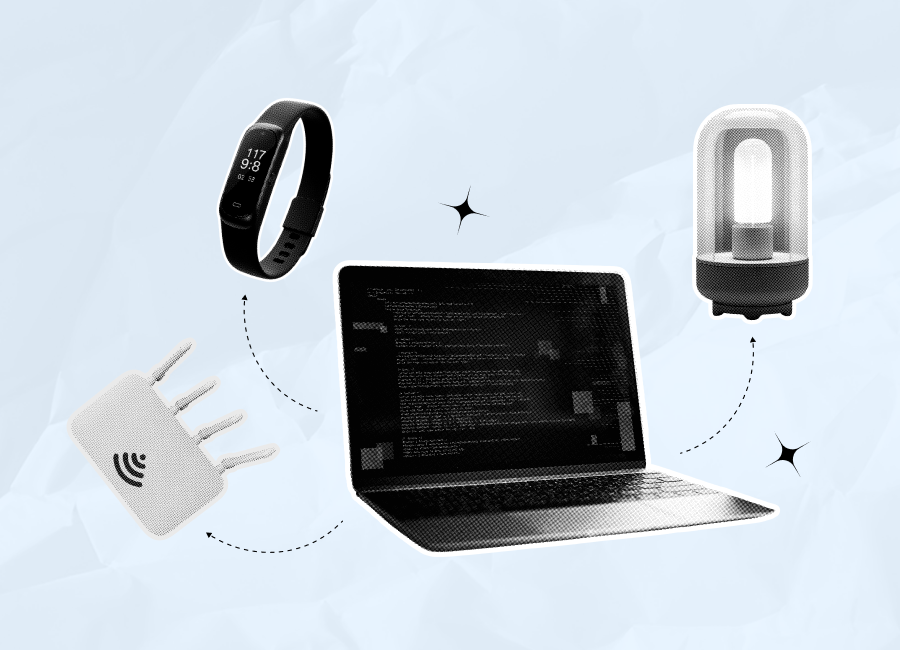The world is seeing a growing demand for electric vehicles boosted by environmental concerns and governmental support for those who decide to buy EVs instead of cars that use traditional petroleum fuels. This is one of the factors that has led to the popularity of a comparatively new type of mobile application built specifically for this market. This group encompasses apps that facilitate a number of tasks faced by EV drivers, such as looking for the nearest charging station or monitoring the charging process.
If you are planning to rock the market with a cutting-edge EV charging station app, this article is for you. In this blog post, we’ll explain the peculiarities of this type of software and some potential pitfalls in charging-station app development.
Electric vehicle apps: Is it worth investing in such projects?
The electric vehicle market is quickly expanding, while major players such as Tesla, NIO, Li Auto, and others are actively fighting for leadership in the industry. The number of electric vehicle models in the market is growing, as well as the number of interested drivers. As a result, the necessity for reliable solutions is climbing.
Just imagine: the global EV market reached $193.55 billion in 2022, and experts believe it will be valued at $693.7 billion by 2030. This means the CAGR for the period 2023-2030 will be over 17%.

Is this a good time to develop an EV charging app? The answer is definitely “yes,” as charging and the process of finding places to do it is among the biggest concerns of new EV drivers. The number of EV charging stations all over the world is growing, but it can still be rather challenging to find them, especially in a new location. An EV station finder app able to define the location of a driver and show the nearest available charging stations on a map will be of great use.
Types of apps for EV drivers
In general, if you are interested in offering a software solution for EV drivers, there are several options:
- EV charging station apps (the type we’re focusing on here);
- Navigation apps with specific features for EVs;
- EV sharing and rental apps;
- Road assistance apps (usually developed for owners of specific models, meant to enhance the driving experience by providing access to special features of the car).
When planning to develop an EV charging app or any other solution for the EV market, you’ll need to think about the appropriate business model. It could be a free app that will be monetized via ads, a free solution with some premium functionality, or a paid application (you can take a download fee or introduce a subscription-based model).
What is an EV station finder app?
The simplest definition of this type of software is: a mobile app that can show the location of electric car charging stations in a chosen area. However, the typical functionality of apps of this type is significantly wider than that.
These applications typically offer users access to data such as descriptions of charging stations, ratings, prices, charging speed, types of plugs supported, real-time availability, and photos meant to help drivers spot the station. Apart from this, applications can provide navigation or simply notify users when they are approaching an EV charging spot.
How does an electric vehicle charging app work?
Interaction with an app is usually organized in a very clear and user-friendly manner.
- Users need to install the app and create an account there (or log in via a social media account).
- To initiate a search for the nearest charging stations, users must allow the app to access their geolocation data or indicate the desired area manually.
- The app will describe all the EV charging stations in the chosen area (distance or radius can be indicated by users) as well as some general information about each of them. Users can see the availability of slots and sometimes book them.
- It is possible to see how much will be charged in advance. Payments can be conducted via the app or at the station.
- As a rule, users can track their progress directly via the app and see the time left to the desired charge during the charging process.
- Charging history on the app is continuously updated, usually including such information as the amount the user paid, the time required to charge the car, etc.
Do you want to build an EV station finder app?
Our team has all the relevant skills and knowledge necessary to create a solution that will quickly win the hearts of drivers!
Key features of an EV charging station app
Before you start to develop an EV charging app, you will need to deeply analyze the market to learn what solutions already exist and discern what unique functionality you can offer to attract potential users’ attention. To begin with, it will be important to rely on the core functionality typical for all solutions in this category.

- Signup. This is a basic feature of many apps. It’s a good idea to allow users to use their Facebook or Gmail accounts, to avoid time-consuming registration procedures.
- User account. To gain access to the major functionality of your app, users will need to add some personal details and information about their vehicles, including model and registration number.
- Geolocation. The app should have access to the real-time location of a smartphone in order to find nearby charging stations. However, if users do not want to share this data, they should be allowed to indicate the preferable areas manually.
- Station info. With your charging station locator app, users should be able to get access to relevant information about stations, read reviews, and leave comments.
- Filter-based search. You can also provide advanced search functionality that includes the ability to filter results, for example according to ratings, price, real-time availability, or providers).
- Slot booking. Users will be happy to have the ability to book a charging slot in advance via your app.
- Payments. You can also allow users to pay for charging directly in your app. You can introduce various payment options, such as a credit card or Paypal. Of course, you would then need to provide access to the user’s billing history.
- Chatbot. An AI-powered chatbot can immediately answer users’ questions and improve the quality of your customer support services.
- Navigation. It will be necessary to use Maps APIs such as Google Maps or Mapbox. This feature will help users find the best route and provide directions.
- Rewards points. You might consider introducing an engaging loyalty program and reward users with vouchers, coupons, or other bonuses for regular use of your application.
How much does it cost to develop an EV station finder app?
If you have ever launched a custom software solution, you may already know that the cost of development services varies, based on a wide range of factors, from the technologies used to the timeframe you set.
Your development team will be able to estimate the cost only after analyzing your project’s requirements. But the general principle for an EV charging station locator is the same as with any solution: the more complex the result, the higher the cost.
Factors typically taken into account for project estimates:
- Type of mobile app (iOS/Android native, hybrid, or cross-platform application);
- Tech stack to be used;
- Composition of the development team;
- Complexity of functionality;
- Integrations:
- Timeframes.
When planning your budget, you also need to bear in mind expenses for marketing and promotion of your app.
Tech stack for building a charging station locator app
As with any other software project, when you want to build a charging station finder app, the choice of technologies and tools will depend on the exact type of your solution and the functionality expected.
Here’s a list of the most widely applied options for charging station app development.
- Mobile development: Kotlin, Java, Swift, Objective-C, Flutter, React Native, Xamarin
- Front-end development: Angular, React, VueJS, JavaScript
- Back-end development: Java, PHP, Golang, .NET, Python, Unity, C/C++, Node.js, Rust, Ruby
- Cloud platform: Azure, AWS, Google Cloud, SAP, Salesforce
- Architecture: Kafka, ZeroMQ, RabbitMQ
- CI/CD: Git, Bamboo, Hit
- DevOps: AWS, Kubernetes, Docker, CloudFormation
- Database: MongoDB, MySQL, PostgreSQL
- Server: Apache, NGINX
- Push notifications: Twilio, Firebase
- Payments: PayPal, Stripe, Klarna, Square, Adyen, Google Pay, Apple Pay
- Maps and Locations: Google Maps, Google Places API, Mapbox, OpenStreetMap
Challenges in creating a charging station finder app
Before initiating a software development project, familiarize yourself with the major challenges you may face.
Multiple integrations
In building a smart charger app, developers may need to ensure integrations with numerous services via APIs. All these integrations are required for creating the rather complex functionality typical for these apps, including searching for electric car charging stations, navigation, and secure payments. Your development team will need to think through optimal ways to integrate these services and allow the app to function seamlessly and without interruption.
Different charging standards
There are three possible EV charging levels, each with different voltage and speed of charging. The industry also has different international and regional EV charging protocols, such as CCS, NACS, OCPP, ISO 15118, and others. All this should be taken into account by developers who build apps for a wide audience of users.
Data protection challenges
EV charging apps gather and store a lot of personal details about their users and their cars, their travels, and locations where they are at the current moment or were some time ago. All this data can attract the attention of hackers and put users’ safety under threat. This means that it’s necessary to start thinking about optimal data protection right from the initial stages of app development planning.
Energy grid load management
Developers need to organize real-time data exchange between a charging station and the app to provide users with access to their energy data on the go, so they can end charging at will and don’t need to wait too long to get back on the road or unnecessarily block other users of the charging station.
Different types of connection with a charging station
A smart charger app should help users monitor the process of charging and track the time left. To ensure this functionality, developers have to make it possible for an app to get connected to a station. Here, for user convenience, it is necessary to enable several types of connection, such as WiFi, Bluetooth, or 4G connectivity.
Our experience in charging station app development
If you’re looking for a team that will be able to develop an EV charging app based on your requirements, know that you can fully rely on us. Our developers already have relevant experience and deeply understand the market trends.
Our team cooperated with COYER, a US-based company, and participated in its development project aimed at building feature-rich iOS and Android app for the electric vehicle industry. Thanks to this app, drivers can find EV charging stations and the nearest parking lots, check charging prices, and track the charging status of their cars.

We were responsible for creating a part of the functionality for the charging station controller. Our task was to make it possible for users to control the EV battery charging process directly via the application on their smartphones.
Being connected to the charging station, a controller sends a signal that can be received by a mobile device so that a user gets real-time information on the charging process. One of the challenges was to ensure reliable data transfer over the internet and in the offline mode. In the latter case, we made it possible to send the signal via a Bluetooth connection. To cope with this task, our IoT software developers worked with an emulator of this controller that was sent to us by the customer.
Today this charging station finder app is already available to users in the US and, according to COYER, the popularity of this product is continuously increasing.
Conclusion
The demand for various mobile apps for EV drivers is directly related to the growing number of electric vehicles in the market. And given the ongoing trend, there is no sign of any imminent decline. That’s why a charging station app development project can be a very promising idea.
If you’re looking for a reliable development team, we will be happy to tell you more about our services. We can join your project at any stage, and we’re sure that with our expertise, we will be able to increase the real value of your solution for your business. Just send your inquiry and we will get back to you as soon as possible.










































